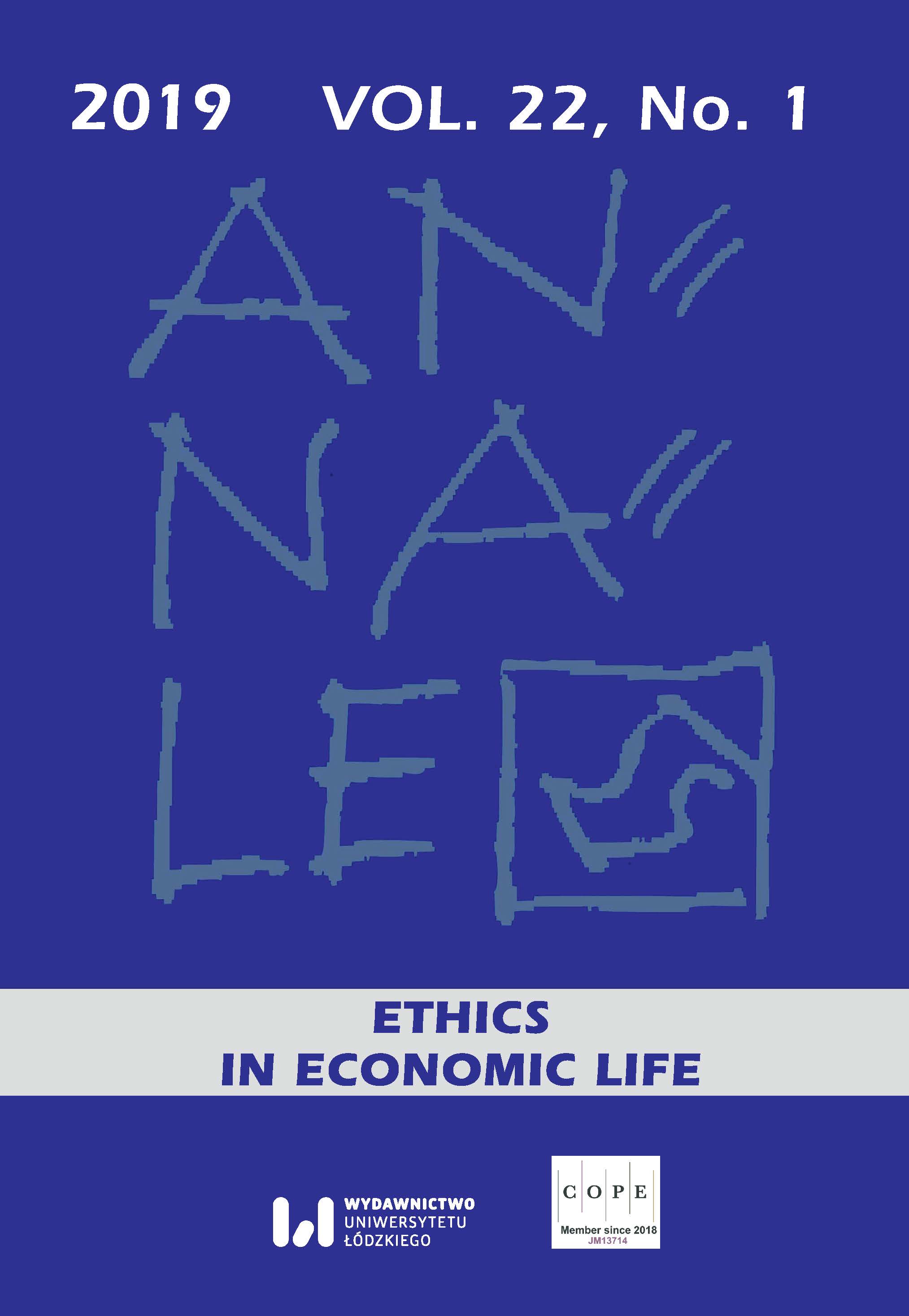Małżeństwa, rozwody i wzrost gospodarczy
DOI:
https://doi.org/10.18778/1899-2226.22.1.03Słowa kluczowe:
divorce rate, economic growth, the European Union, social capitalAbstrakt
The aim of the study is to estimate the impact of the so-called family social capital (family ties capital) on economic growth. We hypothesise that marital dissolution expresses decrease in the capacity for cooperation, collaboration and sharing responsibility not only within the family but also on a professional level. Thus, an increase in the divorce to marriage rate is accompanied by a slowdown in economic growth.
The divorce rate is regarded here as an indirect cause of the slowdown. The reasons stem from the breakdown of cooperation and collaboration, as well as increased risk, trust reduction, and the shortening of the decision-making time horizon accompanying divorces and resulting from divorces. These phenomena directly affect the working members of the family in which a divorce takes place. According to the main hypothesis, their impact is transferred to professional life and concerns employee teams.
For the study, we employ econometric models, the first one for Poland and the second for 15 European Union countries, for the period 1993–2017.
Bibliografia
Ambroziak, E., Starosta, P., & Sztaudynger, J. J. (2016). Zaufanie, skłonność do pomocy i uczciwość a wzrost gospodarczy w Europie [Trust, helpfulness, fairness and economic growth in Europe]. Ekonomista, 5, 647–673.
Google Scholar
Anioła-Mikołajczak, P., & Gołaś, Z. (2014). The socioeconomic conditions of saving behaviours in Polish households. Acta Scientiarum Polonorum. Oeconomia, 13(4), 7–17.
Google Scholar
Becker, G. S. (1993). A treatise on the family. Cambridge, London: Harvard University Press.
Google Scholar
Beugelsdijk, S., & van Schaik, T. (2005). Social capital and growth in European Regions: An empirical test. European Journal of Political Economy, 21(2), 301–324.
Google Scholar
Blaug, M. (1994). Teoria ekonomii. Ujęcie retrospektywne. Warszawa: Wydawnictwo Naukowe PWN.
Google Scholar
Braver, S. L., & Lamb, M. E. (2013). Marital dissolution. In G. W. Peterson, & K. R. Bush (Eds.), Handbook of marriage and the family. Boston: Springer.
Google Scholar
Coleman, J. S. (1988). Social capital in the creation of human capital. American Journal of Sociology, 94, Supplement, 95–120.
Google Scholar
Czapiński, J., & Panek, T. (Eds.) (2015). Social diagnosis 2015. Objective and subjective quality of life in Poland. Contemporary Economics. Quarterly of University of Finance and Management in Warsaw, 9(4).
Google Scholar
Durlauf, S. N., & Fafchamps, M. (2005). Social capital. In P. Aghion, & S. N. Durlauf (Eds.), Handbook of Economic Growth (pp. 1639–1699). Amsterdam: Elsevier.
Google Scholar
Dzionek-Kozłowska, J. (2006). Ekonomista jako kaznodzieja: George J. Stigler versus Alfred Marshall. Annales. Etyka w Życiu Gospodarczym, 9(1), 67–76.
Google Scholar
Dzionek-Kozłowska, J. (2018). Model homo oeconomicus. Geneza, ewolucja, wpływ na rzeczywistość gospodarczą. Łódź: Wydawnictwo Uniwersytetu Łódzkiego.
Google Scholar
Dzionek-Kozłowska, J., & Matera, R. (2015). Ethics in Economic Thought. Selected Issues and Various Perspectives. Łódź–Kraków: Łódź University Press & Jagiellonian University Press.
Google Scholar
Fedorczuk, M., Kliszko, C., & Męcina, J. (2009). Kondycja i warunki dialogu społecznego na poziomie zakładu pracy opinii jego aktorów. In J. Męcina (Ed.), Dialog społeczny na poziomie zakładu Pracy. Między zasadami a realiami (pp. 69–84). Warszawa: Ministerstwo, Pracy i Polityki Społecznej.
Google Scholar
Giddens, A. (1991). Modernity and self-identity: Self and society in the late modern age. Cambridge UK: Polity Press.
Google Scholar
Glaeser, E., Laibson, D., & Sacerdote, B. (2002). An economic approach to social capital. Economic Journal, 112(483), 437–458.
Google Scholar
Growiec, J., & Growiec, K. (2010). Social capital, well-being, and earnings. Theory and evidence from Poland. European Societies, 12(2), 231–255.
Google Scholar
John Paul II. (1987, June 11). Homily on Holy Mass for families. Szczecin. http://fatima.szczecin.pl/czytelnia/szczegoly/3
Google Scholar
Knack, S., & Keefer, P. (1997). Does social capital have an economic payoff? A cross-country investigation. Quarterly Journal of Economics, 112(4), 1251–1288.
Google Scholar
Kocik, L. (2006). Rodzina w obliczu wartości i wzorów ponowoczesnego świata. Kraków: Oficyna Wydawnicza AFM.
Google Scholar
Liberda, B. (2000). Oszczędzanie w gospodarce polskiej: teorie i fakty. Warszawa: Dom Wydawniczy Bellona.
Google Scholar
Malaczewski, M. (2018). Natural resources as an energy source in a simple economic growth model. Bulletin of Economic Research, 70(4), 362–380.
Google Scholar
Paldam, M. (2000). Social capital: One or many? Definition and measurement. Journal of Economic Surveys, 14(5), 629–653.
Google Scholar
Paszkiewicz, M. (2011). Wpływ kapitału społecznego na wzrost gospodarczy, na przykładzie wybranych czynników (Unpublished doctoral dissertation prepared under the supervision of J. J. Sztaudynger). Łódź: University of Łódź.
Google Scholar
Putnam, R. D. (2001). Bowling alone: The collapse and revival of American community. New York: Simon and Schuster.
Google Scholar
Sabatini, F. (2006, February). Social capital and labour productivity in Italy, “Fondazione Eni Enrico Mattei WP”, no. 30. https://core.ac.uk/download/pdf/6264629
Google Scholar
Sapharas, N. K., Estell, D. B., Doran K. A., & Waldron, M. (2016). Effects of parental divorce or a father’s death on high school completion. Psychology in the Schools, 53(8), 861–874.
Google Scholar
Slany, K. (2003). Dylematy i kontrowersje wokół małżeństwa i rodziny we współczesnym świecie. In J. Balicki, E. Frątczak, J. Hrynkiewicz, A. Jagielski, J. T. Kowaleski, & K. Slany (Eds.), Wybrane problemy współczesnej demografii (pp. 26–52). Łódź: Zakład Demografii Uniwersytetu Łódzkiego.
Google Scholar
Stolarska, B. (2013). Wynagrodzenia małżonków i kohabitantów. Annales. Etyka w Życiu Gospodarczym, 16, 271–280.
Google Scholar
Sztaudynger, J. J. (2005). Wzrost gospodarczy a kapitał społeczny, prywatyzacja i inflacja. Warszawa: Wydawnictwo Naukowe PWN.
Google Scholar
Sztaudynger, J. J. (2009). Rodzinny kapitał społeczny a wzrost gospodarczy w Polsce. Ekonomista, 2, 189–210.
Google Scholar
Wallerstein, J. S., & Blakeslee, S. (1989). Second chances. Men, women, and children a decade after divorce. New York: Ticknor&Fields.
Google Scholar
Zak, P. J., & Knack, S. (2001). Trust and growth. Economic Journal, 111(470), 295–321.
Google Scholar
Pobrania
Opublikowane
Jak cytować
Numer
Dział
Licencja

Utwór dostępny jest na licencji Creative Commons Uznanie autorstwa – Użycie niekomercyjne – Bez utworów zależnych 4.0 Międzynarodowe.









